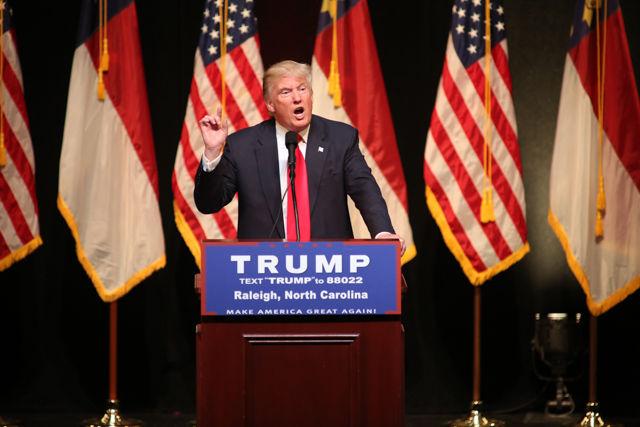As of Wednesday, it has officially been one year since Donald Trump was elected as the 45th president of the United States. Within this time frame, there have been numerous changes that have occurred within politics, with many of these alterations being either accepted or widely contested.
“There’s been a drastic change in politics ever since the election,” said Andrew Morrison, a third-year studying political science and economics and the current president of the NC State College Democrats. “On an individual level, we can see it on our Facebook walls and interactions with people. On a national level, it’s easy to see the kind of attention these stories are getting nowadays; rather than looking at larger issues, we’re focused on Donald Trump’s Twitter and other stuff like that.”
Despite all the attention Trump has drawn to himself, it is not uncommon for first-time presidents to face increased scrutiny when they first take up the office.
“There’s always a trend in politics; during a president’s first year, most people are either crazy about the president or are highly critical of them,” said Harrison Preddy, a fourth-year student studying political science and the president of the College Republicans at NC State. “What’s going on now, however, is going to permeate beyond this year. For all we know, this may pan out and be a learning experience for us all, going forward.”
However, the way Trump has chosen to carry himself as president has proven to be significantly different from any of his predecessors.
“Donald Trump is a historically unique president,” said Steven Greene, a professor in NC State’s political science department. “A fair amount of the stuff we have going on is because we have a Republican president, and a Republican Congress, and the exact same things would have happened under, let’s say, a President Rubio.”
Although the contrast has been made clearer through the recent administration, politics have been becoming more and more polarized for quite some time.
“We were already very polarized before the election, and we’re even more polarized now,” Greene said. “There seems to be less ground to compromise on, and politics have become, more than ever, a ‘take no prisoners’ game. When you look at a fair amount of the support for President Trump, there’s a sense of a mentality where, if President Trump says it, they will believe it, or if President Trump does it, it’s a good thing. On the opposite side you have people who don’t believe him, where if he does something it’s a bad thing. We’re increasingly seeing our politics filtered through a ‘Trump-ian’ lens.”
Since the election, there has been a surge of political activity and awareness on campus in both parties, with students becoming more involved with current political, social and economic issues.
“I’ve seen a lot of new political organizations sprout up on campus after the election; people want to be more active,” Morrison said. “It’s nothing new for young people to be politically active, but I’ve really seen it grow since last November.”
Despite these ever-present divides, political activists on campus, such as Preddy, urge for a more mindful approach to politics, particularly in the NC State community.
“Something we need to remember is that NC State’s campus is a place meant to have differing viewpoints, and we should make sure that we are respecting diversity on all sides,” Preddy said.
Going forward, many are still wondering what will happen in the years to come, and how politics will continue to change as we progress.
“In one sense, the key test is what happens next,” Greene said. “We may say ‘okay, this is what we expect from our president now.’ Then if the next president does that, then we’d say ‘okay, this is what we’ve got now.’ I don’t think that’s going to happen, but it’s always a risk.”








